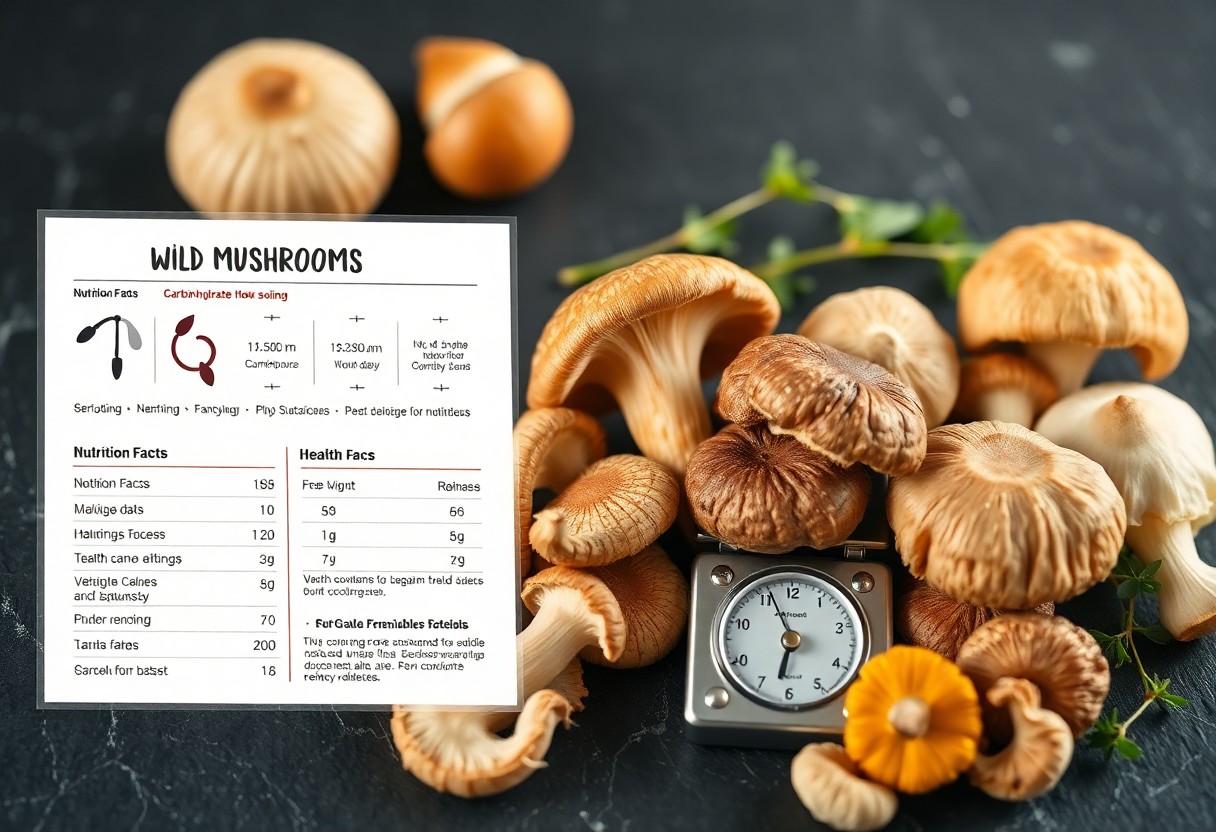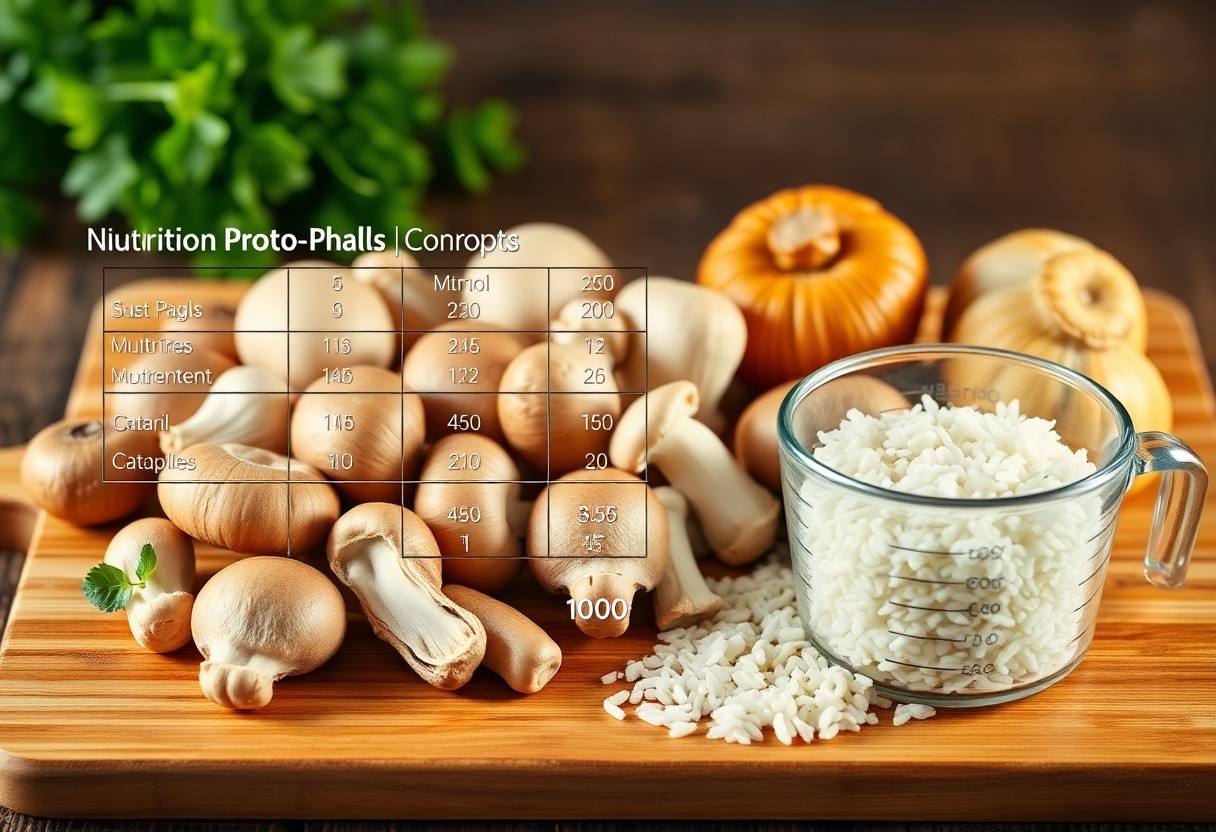With their low carbohydrate content and rich nutritional profile, mushrooms can be a valuable addition to your diet. This post will explore the key nutrition facts, highlight the health benefits, and provide insights for those following a low-carb lifestyle. Discover why mushrooms are not only versatile but also nutritious by checking out this resource on Mushroom - Shedding Light on their Nutritional Value.

Key Takeaways:
- Mushrooms are low in carbohydrates, making them suitable for low-carb diets.
- They provide important nutrients including fiber, vitamins, and minerals, contributing to overall health.
- The low glycemic index of mushrooms may aid in blood sugar management.
Nutritional Profile of Mushrooms
Mushrooms pack a diverse array of nutrients while remaining low in calories. Depending on the type, they are an excellent source of vitamins such as B vitamins (B2, B3, and B5) and minerals including selenium and potassium. This unique combination promotes overall health and aligns well with various dietary preferences, including vegetarian and low-carb diets.
Carbohydrate Content
Your average serving of mushrooms contains about 2 to 3 grams of carbohydrates, depending on the type. This makes them an ideal food choice for those looking to reduce their carbohydrate intake without sacrificing important nutrients. With a low glycemic index, mushrooms can help maintain stable blood sugar levels.
Other Key Nutrients
Mushrooms offer a wealth of additional nutrients, including fiber, antioxidants, and important minerals. Rich in polysaccharides, they support immune function and provide cancer-fighting properties. Varieties like shiitake and maitake also contain beta-glucans, known for promoting heart health and reducing cholesterol levels.
A significant aspect of mushrooms is their fiber content, particularly soluble fiber, which aids digestion and helps maintain a healthy gut microbiome. The antioxidants, including ergothioneine and glutathione, help combat oxidative stress and reduce inflammation. Additionally, minerals such as copper and selenium play vital roles in metabolic processes, enhancing your overall health profile and making mushrooms a powerful addition to any diet.
Health Benefits of Mushrooms
Mushrooms offer a wide array of health benefits, making them a valuable addition to your diet. Packed with vitamins, minerals, and unique bioactive compounds, they promote overall wellness while supporting specific bodily functions. Including mushrooms in your meals can enhance nutrient intake and contribute positively to your health journey.
Antioxidant Properties
The antioxidant properties of mushrooms play a significant role in combating oxidative stress in your body. Various types, such as shiitake and cremini, contain compounds like ergothioneine and selenium. These antioxidants help neutralize free radicals, reducing the risk of chronic diseases and supporting cellular health.
Immune Support
Mushrooms bolster your immune system through bioactive compounds like beta-glucans, which enhance the activity of immune cells. Regular consumption may elevate your body’s defense mechanisms, helping fend off infections and illnesses. Additionally, certain mushrooms, such as reishi and maitake, are known for their potent immune-modulating effects, making them ideal for boosting overall immunity.
Consuming mushrooms like reishi has been linked to increased production of white blood cells, vital for your immune defense. Studies indicate that they may also upper immune function in individuals undergoing stress or experiencing immune system challenges. By adding these varieties to your diet, you support not just immune response but also overall health, potentially decreasing the likelihood of getting sick. This makes mushrooms a smart choice for those looking to enhance their wellness and maintain a robust immune system.
Mushrooms in Low-Carb Diets
Mushrooms are an excellent addition to low-carb diets due to their low carbohydrate content, which typically ranges from 1 to 5 grams per 100 grams depending on the variety. They provide a hearty texture and umami flavor, satisfying your cravings without compromising your carb limits. Incorporating mushrooms into your meals can enhance nutritional value while keeping calorie counts in check, making them an ideal choice for weight management and overall health.
Low Glycemic Index
Mushrooms have a low glycemic index, which means they affect blood sugar levels minimally compared to high-carb foods. This feature supports stable energy levels and reduces the risk of insulin spikes, making mushrooms a smart choice for those managing diabetes or following a ketogenic diet. You can enjoy them in various dishes without worrying about significant carbohydrate impacts, helping you stay in ketosis or achieve your health goals.
Ideal Mushroom Varieties
Opt for mushrooms like shiitake, portobello, and cremini when seeking low-carb options. These varieties provide distinct flavors and versatile uses, from stir-fries to stuffed dishes. Shiitake mushrooms, for instance, contain about 6 grams of carbs per 100 grams, while portobello mushrooms are around 3.9 grams. Incorporating these can enhance your meals without exceeding your daily carb allowance.
Shiitake mushrooms not only add a rich flavor to your dishes but also come packed with vitamins B and D, as well as antioxidants. Portobello mushrooms serve as an excellent meat substitute due to their substantial size and savory taste, making them ideal for grilling. For even lower carb options, consider white button mushrooms, which contain just 3 grams of carbs per 100 grams. By selecting these varieties, you can maximize nutritional benefits while maintaining your desired macronutrient ratios.
Culinary Uses of Mushrooms in Low-Carb Meals
Mushrooms are versatile ingredients that can enhance your low-carb meals, offering depth of flavor without excessive carbohydrates. You can incorporate them into stir-fries, salads, or as a meat substitute in various dishes. For more on their nutritional value, check Carbs in Mushrooms: Understanding the Nutritional Value ....
Recipes and Preparation Tips
Experimenting with mushrooms in your kitchen can yield delicious low-carb recipes. Sauté them with garlic and olive oil to make a flavorful side dish or use them as a base for creamy soups. A few preparation tips include:
- Choose a variety of mushrooms for diverse flavors.
- Always clean them gently to avoid waterlogging.
- Try grilling or roasting for added depth.
Recognizing the various types can elevate your meals significantly.
Pairing Suggestions
Your choice of ingredients can significantly enhance mushroom dishes. Pair them with proteins like chicken or shrimp to create satisfying, low-carb dinners. Complement mushrooms with herbs such as thyme or rosemary for extra aroma. Adding cheese, like parmesan or feta, can elevate your dish's richness while keeping carbs low. For a refreshing twist, consider pairing them with leafy greens or avocado, which offer healthy fats and additional nutrients, ensuring a balanced meal that caters to your low-carb lifestyle.

Myths and Misconceptions About Carbs in Mushrooms
Numerous myths surround the carbohydrate content of mushrooms, leading to confusion among those pursuing low-carb diets. Many incorrectly believe that mushrooms are high in carbs, overshadowing their beneficial nutritional profile. For detailed insights, check out Mushroom Nutrition Facts and Health Benefits.
Common Misunderstandings
One common misunderstanding is that all mushrooms contain significant amounts of carbohydrates, which can deter individuals from incorporating them into their meals. In reality, most mushroom varieties have low carb content, making them suitable for your dietary needs.
Clarifying Nutritional Facts
Mushrooms typically contain around 2-3 grams of carbohydrates per 100 grams, depending on the variety. This low amount, combined with their rich micronutrient profile, makes mushrooms an excellent choice for enhancing any low-carb diet.
A common misconception may stem from the perception of mushrooms as starch-heavy foods; however, they are primarily composed of water (about 90%), proteins, and fiber while remaining low in carbohydrates. For instance, one cup of sliced white mushrooms contains approximately 2.3 grams of carbohydrates, showcasing their status as low-carb powerhouses. This makes them ideal for various dishes while offering vital nutrients like B vitamins, potassium, and antioxidants that can support overall health.
Conclusion
Hence, understanding the carbohydrate content in mushrooms empowers you to make informed dietary choices. With their low-carb nature and rich nutritional profile, mushrooms serve as an excellent addition to your meals, particularly if you're following a low-carb diet. Their health benefits, including antioxidants and fiber, enhance your overall well-being while providing versatility in cooking. Incorporating mushrooms into your diet not only supports your nutritional goals but also diversifies your meals in a delicious, satisfying way.
FAQ
Q: What is the carbohydrate content in mushrooms?
A: Mushrooms contain approximately 3 to 4 grams of carbohydrates per 100 grams, depending on the variety. Most of these carbs are fiber, which is beneficial for digestion.
Q: Are mushrooms a good option for low-carb diets?
A: Yes, mushrooms are low in carbohydrates, making them an excellent choice for low-carb diets. They provide valuable nutrients without significantly impacting carbohydrate intake.
Q: What are the health benefits of the carbohydrates found in mushrooms?
A: The carbohydrates in mushrooms mainly come from dietary fiber, which supports digestive health, helps regulate blood sugar levels, and may aid in weight management.
Q: How do mushrooms compare to other vegetables in terms of carbs?
A: Mushrooms are lower in carbohydrates compared to many other vegetables. For instance, they have fewer carbs than potatoes and corn, making them a preferable option for low-carb diets.
Q: Can mushrooms help in weight loss on a low-carb diet?
A: Yes, mushrooms can aid in weight loss due to their low-calorie and low-carb content. They provide satisfaction and volume in meals without adding many calories or carbs.

0 Comments